The Best 10 Alternatives to Absolute Secure Endpoint (+ Pricing & Reviews)
Twingate Team
•
Jul 27, 2024

Absolute Secure Endpoint provides reliable and resilient endpoint security for the anywhere workforce. It serves as a source of truth for device and application health, protects at-risk devices and data, and delivers application self-healing and confident risk response. However, it might not be the choice for everyone. This article introduces Absolute's product offerings, focusing on Secure Endpoint and Secure Access solutions.
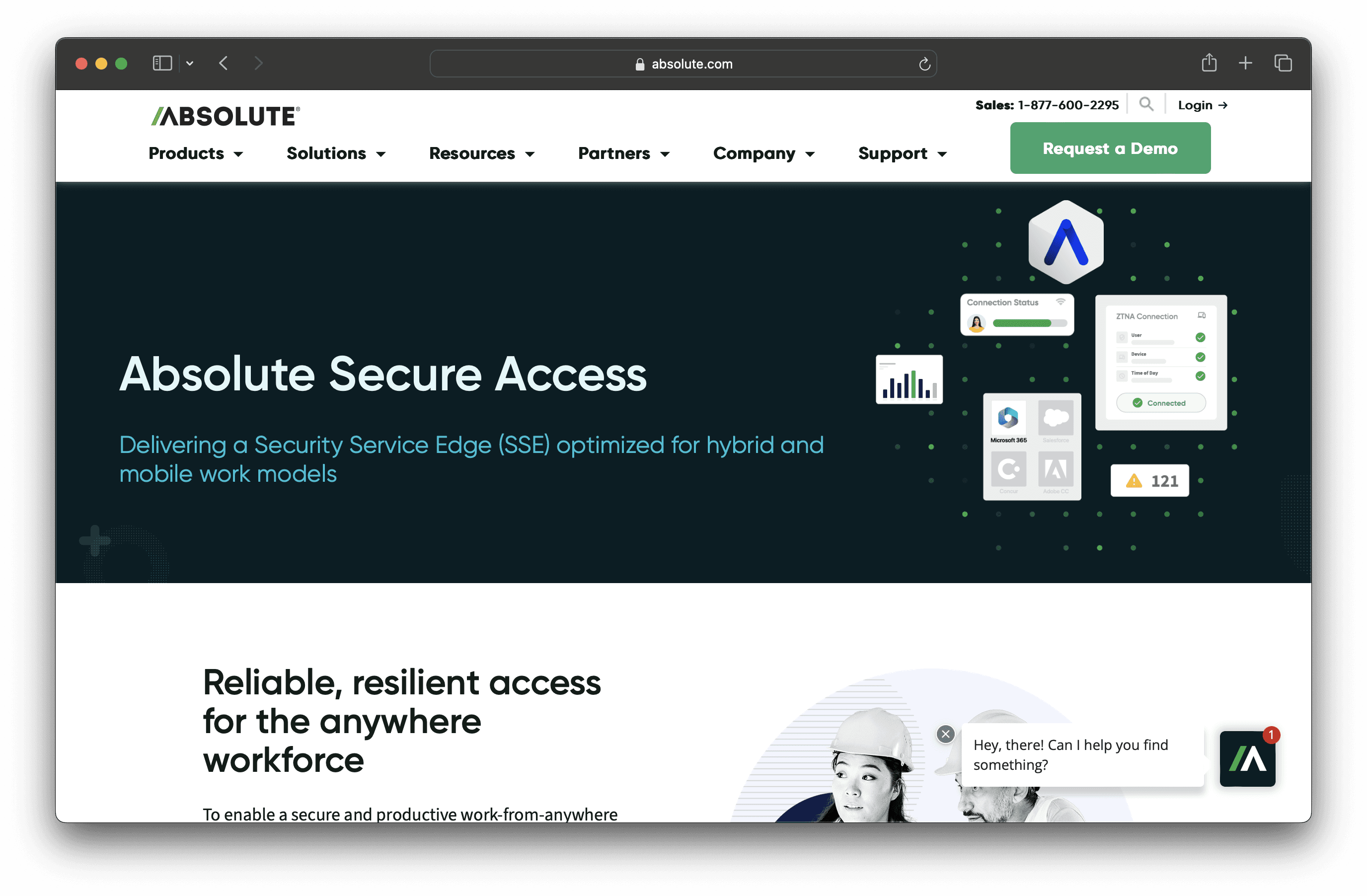
10 Alternatives to Absolute Secure Endpoint
1. WatchGuard Panda Adaptive Defense 360
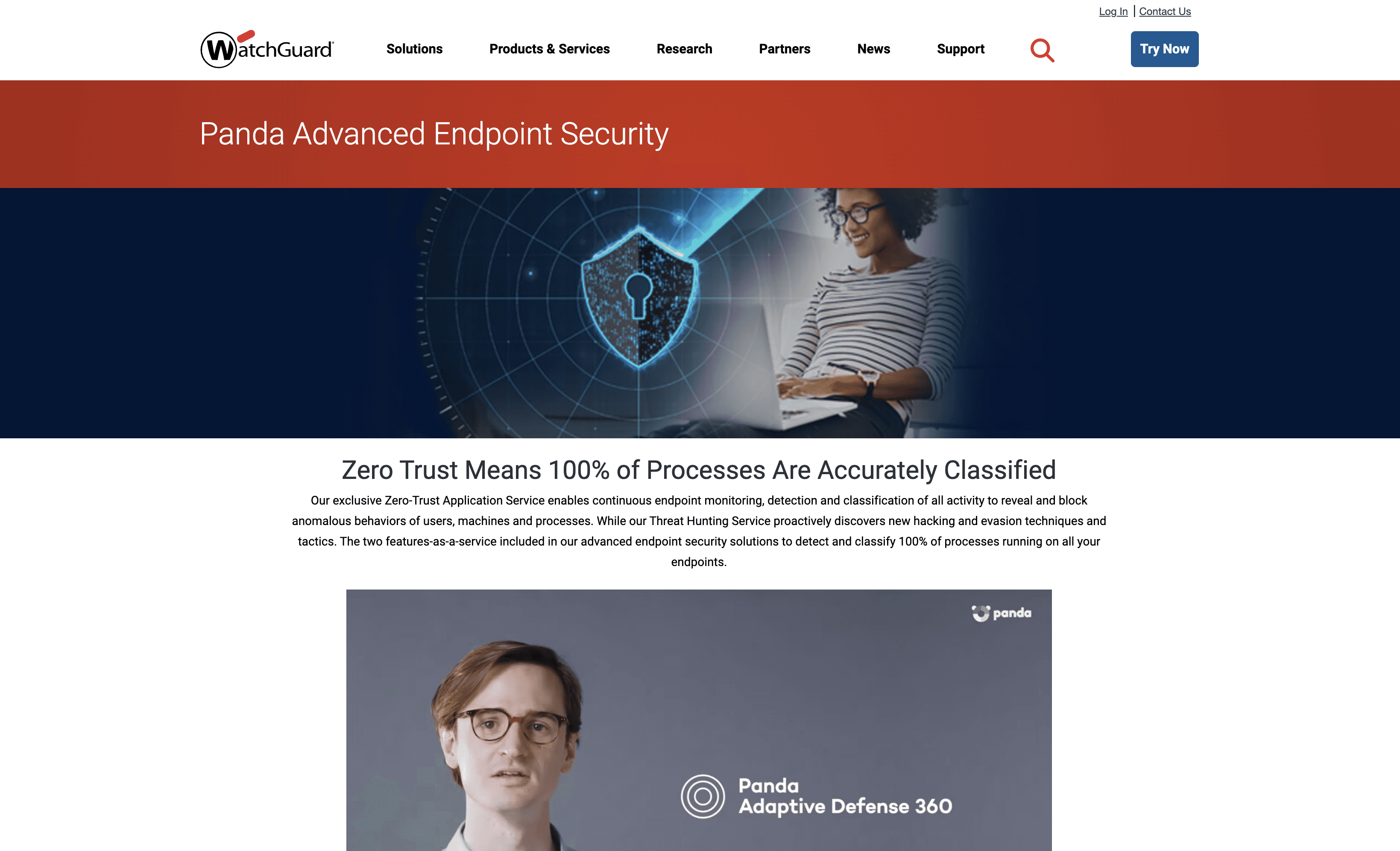
WatchGuard Panda Adaptive Defense 360 is an advanced endpoint security solution that continuously monitors and classifies all activities on endpoints. It uses a Zero-Trust Application Service to ensure only trusted processes run and a Threat Hunting Service to proactively discover new hacking techniques, providing robust defense against cyber threats.
WatchGuard Panda Adaptive Defense 360 Pricing
WatchGuard Panda Adaptive Defense 360's pricing is not public. Contact their support for more info.
WatchGuard Panda Adaptive Defense 360 Reviews
WatchGuard Panda Adaptive Defense 360 has an overall rating of 4.4 out of 5 stars based on 115 reviews. Users appreciate its comprehensive protection and ease of use. Check out more of our reviews here!
Pros and Cons of WatchGuard Panda Adaptive Defense 360
Pros:
Automates and reduces detection, response, and investigation time, enhancing overall security efficiency.
Provides forensic information to investigate each attack attempt and tools to mitigate its effects.
Detects and blocks hacking techniques, tactics, and procedures, ensuring robust endpoint protection.
Cons:
Complexity in implementation may require significant setup and configuration efforts.
Dependency on cloud services for classification and threat hunting might be a concern for some organizations.
Advanced security features could come at a higher cost, potentially impacting smaller organizations.
2. SentinelOne
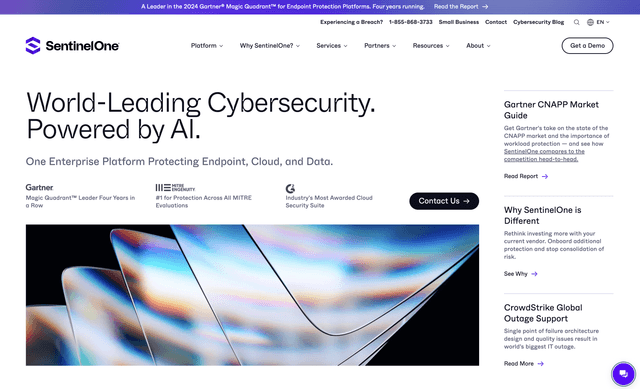
SentinelOne is an AI-powered cybersecurity platform designed to protect endpoints, cloud environments, and identity resources. It integrates various security tools to offer real-time data insights and automated threat responses, making it a comprehensive solution for enterprise-wide protection.
SentinelOne Pricing
Singularity Core: $69.99 per endpoint
Singularity Control: $79.99 per endpoint
Singularity Complete: $159.99 per endpoint
Singularity Commercial: $209.99 per endpoint
Singularity Enterprise: Contact their support for more info.
SentinelOne Reviews
SentinelOne has an overall rating of 4.7 out of 5 stars based on 179 reviews. Users appreciate its excellent threat visibility and fast response times. Check out more of our reviews here!
Pros and Cons ofSentinelOne
Pros:
AI-Powered Security: Utilizes AI to provide real-time protection and actionable insights, ensuring robust defense against evolving threats.
Comprehensive Protection: Covers endpoints, cloud, and identity resources, offering a unified security solution for diverse environments.
High Performance: Recognized for leading analytic coverage and zero detection delays, ensuring swift and accurate threat responses.
Cons:
Complexity: The platform's comprehensive nature may require significant time and resources to fully implement and manage.
Cost: Advanced features and AI capabilities might come at a higher price point, which could be a barrier for smaller organizations.
Learning Curve: Users may need extensive training to effectively utilize all features and capabilities of the platform.
3. WatchGuard Endpoint Security
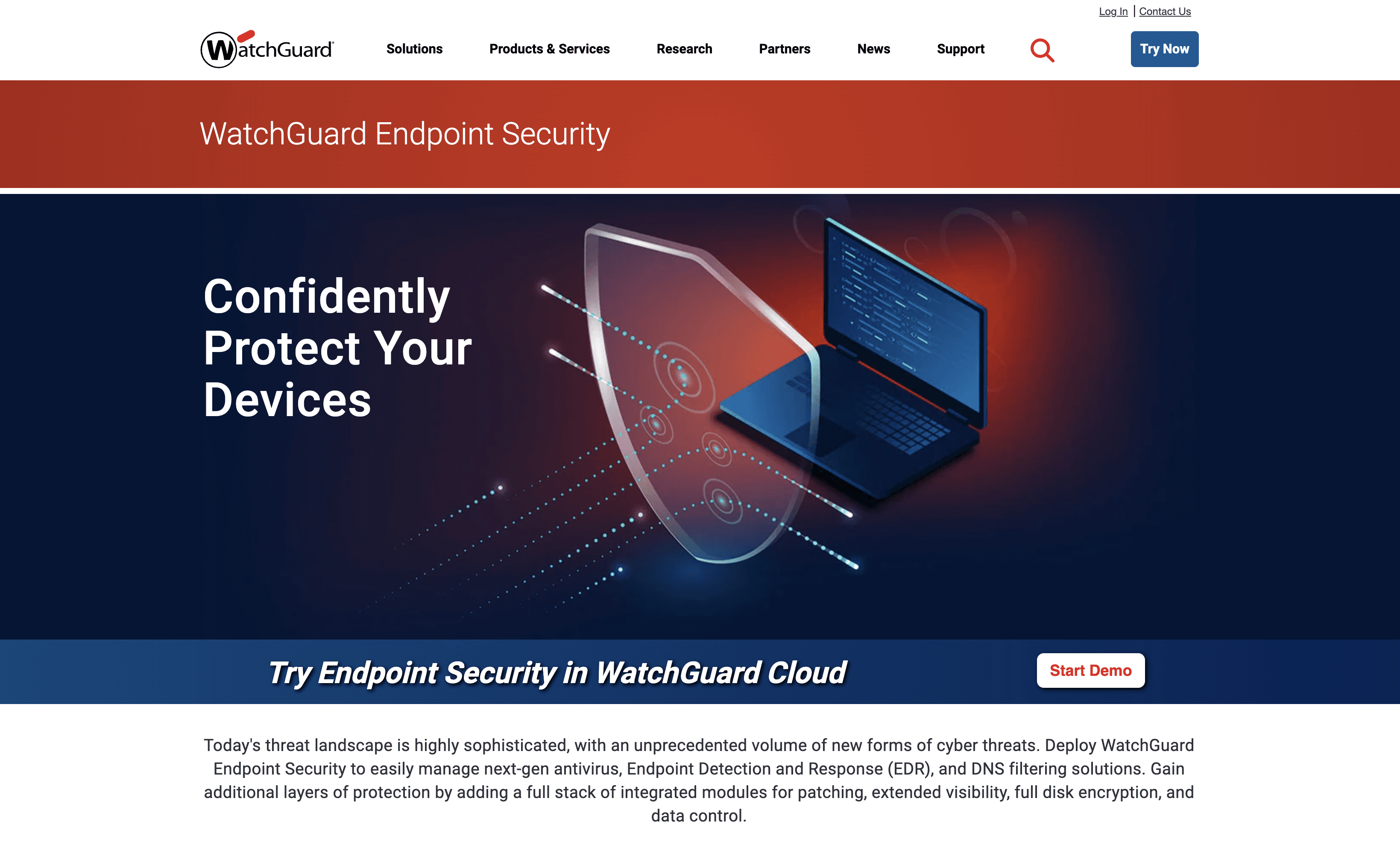
WatchGuard Endpoint Security is a comprehensive cybersecurity solution designed to protect against advanced threats. It integrates next-gen antivirus, Endpoint Detection and Response (EDR), and DNS filtering into a unified platform. With centralized management and operational automation, it offers robust protection and ease of use for businesses of all sizes.
WatchGuard Endpoint Security Pricing
WatchGuard Endpoint Security's pricing is not public. Contact their support for more info.
WatchGuard Endpoint Security Reviews
WatchGuard Endpoint Security has an overall rating of 4.4 out of 5 stars based on 115 reviews. Users appreciate its comprehensive protection and ease of use. Check out more of our reviews here!
Pros and Cons of WatchGuard Endpoint Security
Pros:
Comprehensive Protection: Integrates next-gen antivirus, EDR, and DNS filtering for robust defense against advanced threats.
Unified Security Platform: Centralized management and operational automation streamline security processes and enhance visibility.
Advanced Threat Detection: Effectively identifies sophisticated threats like fileless malware, APTs, and ransomware.
Cons:
Complexity for Small Businesses: The platform's comprehensive nature may overwhelm smaller organizations with limited IT resources.
Dependency on Cloud: Heavy reliance on cloud-based management could be problematic for organizations with strict data residency requirements.
Potential Cost: Advanced features and integrated modules might come at a higher price, impacting budget-conscious organizations.
4. F-Secure Elements
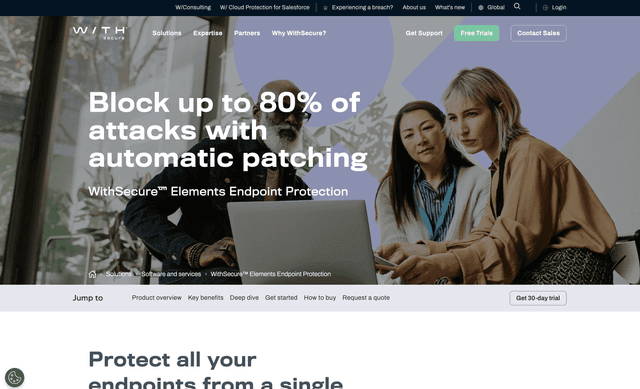
F-Secure Elements is a cloud-native, AI-powered endpoint protection solution designed to safeguard various devices. It offers automated patch management, multi-engine malware protection, and cloud-based threat analysis. With easy deployment and centralized management, it aims to provide robust security for businesses of all sizes.
F-Secure Elements Pricing
F-Secure Elements's pricing is not public. Contact their support for more info.
F-Secure Elements Reviews
F-Secure Elements has an overall rating of 4.4 out of 5 stars based on 17 reviews. Users appreciate its ease of deployment and effectiveness in threat detection. Check out more of our reviews here!
Pros and Cons of F-Secure Elements
Pros:
Automated Patch Management: Blocks up to 80% of ransomware attacks, ensuring robust endpoint security.
Multi-engine Malware Protection: Provides comprehensive defense against various malware types, enhancing overall security.
Cloud-native Deployment: Simplifies management and monitoring from a single console, making it user-friendly.
Cons:
Premium Features: Advanced features like DataGuard and Endpoint Encryption are only available in the premium version.
Complex Interface: The interface may be overwhelming for smaller businesses with limited IT resources.
Dependence on Cloud: Requires a reliable internet connection for optimal performance and management.
5. Cylance
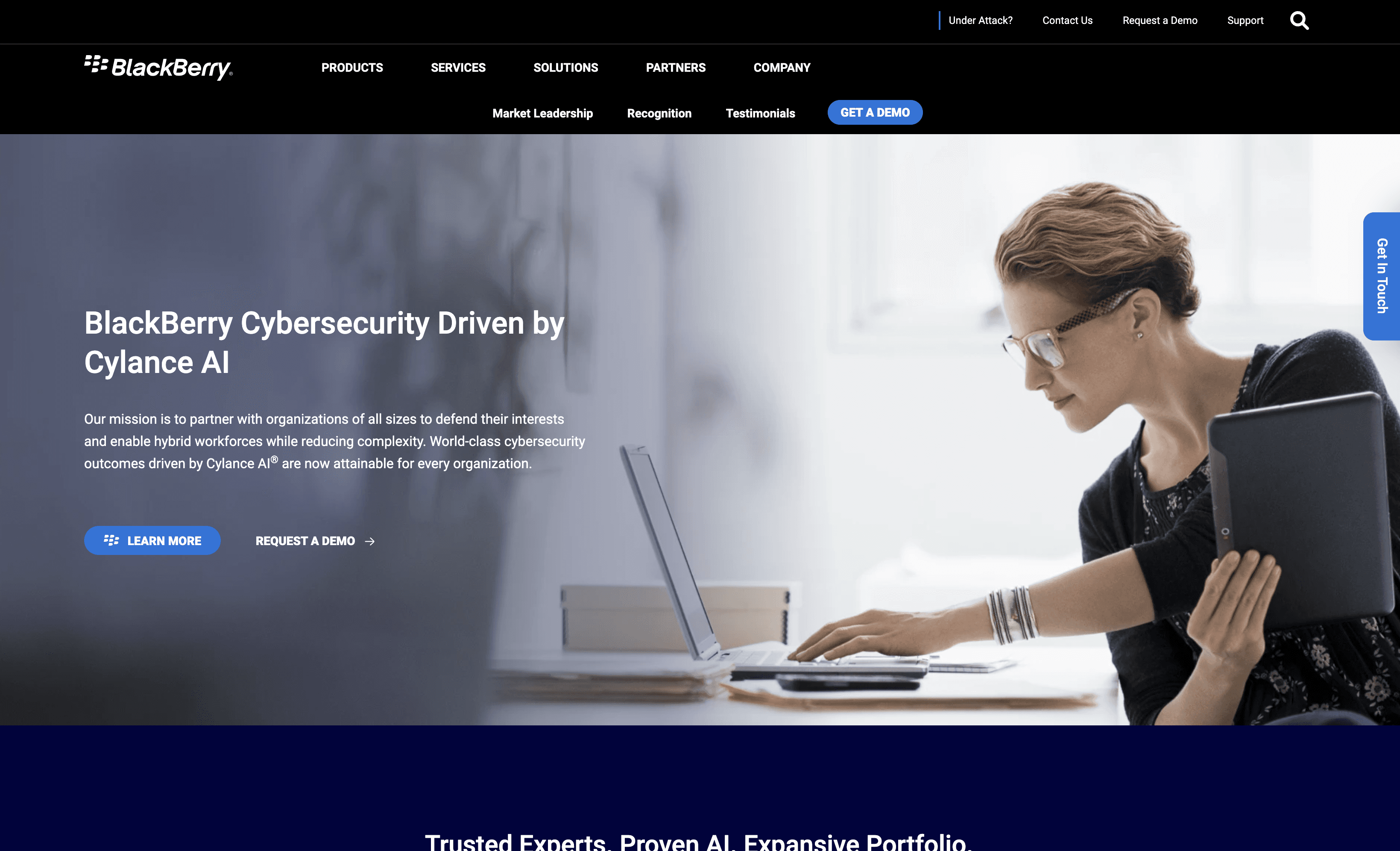
Cylance is an AI-driven cybersecurity solution designed to protect endpoints from advanced threats. It leverages machine learning to predict and prevent attacks in real-time, offering robust security with minimal system impact. Cylance aims to provide a seamless and effective defense for businesses of all sizes.
Cylance Pricing
Cylance's pricing is not public. Contact their support for more info.
Cylance Reviews
Cylance has an overall rating of 4.3 out of 5 stars based on 57 reviews. Users appreciate its AI-driven protection and ease of use. Check out more of our reviews here!
Pros and Cons of Cylance
Pros:
High Efficacy Ratings: Cylance AI-driven solutions deliver some of the highest efficacy ratings in the market, ensuring robust protection.
Low CPU Utilization: Uses up to 20x less CPU, even without an internet connection, compared to other solutions, enhancing performance.
Broad, Integrated Controls: Solutions span network, endpoint, and cloud, providing a resilient defense for any-sized organization.
Cons:
Initial Setup and Training: Onboarding and deployment require a training period to adapt the product to the environment, which can be time-consuming.
Dependence on AI: Heavy reliance on AI might be a concern for organizations that prefer more traditional, human-driven approaches to cybersecurity.
Cost: While cost-effective compared to building a SOC, the initial investment in AI-driven solutions might still be significant for smaller organizations.
6. Threatlocker
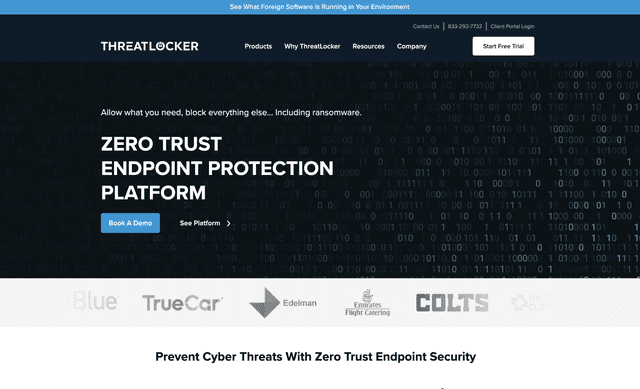
ThreatLocker is a cybersecurity solution focused on Zero Trust endpoint protection. It offers features like Allowlisting, Ringfencing™, and Network Control to prevent unauthorized access and malware. With easy deployment and centralized management, ThreatLocker aims to provide robust security for businesses of all sizes.
Threatlocker Pricing
Threatlocker's pricing is not public. Contact their support for more info.
Threatlocker Reviews
Threatlocker has an overall rating of 4.8 out of 5 stars based on 162 reviews. Users appreciate its robust security features and ease of use. Check out more of our reviews here!
Pros and Cons of Threatlocker
Pros:
Comprehensive Zero Trust Protection: ThreatLocker offers a robust Zero Trust endpoint protection platform, ensuring that only authorized applications and processes can run, significantly reducing the risk of cyber threats.
Wide Range of Features: With tools like Allowlisting, Ringfencing™, and Network Control, ThreatLocker provides extensive control over network traffic and application behavior, enhancing overall security.
24/7 Expert Support: The Cyber Hero® Team offers round-the-clock support, ensuring quick response times and expert assistance whenever needed, which is crucial for maintaining robust security.
Cons:
Steep Learning Curve: Implementing and managing ThreatLocker’s comprehensive features can be complex, requiring significant time and effort to fully understand and utilize the platform effectively.
Compatibility Issues: Some users have reported difficulties with integrating ThreatLocker into existing systems, which can lead to operational challenges and require additional troubleshooting.
Configuration Complexity: Setting up and configuring ThreatLocker to meet specific security needs can be intricate, potentially overwhelming smaller organizations with limited IT resources.
7. Vipre EDR
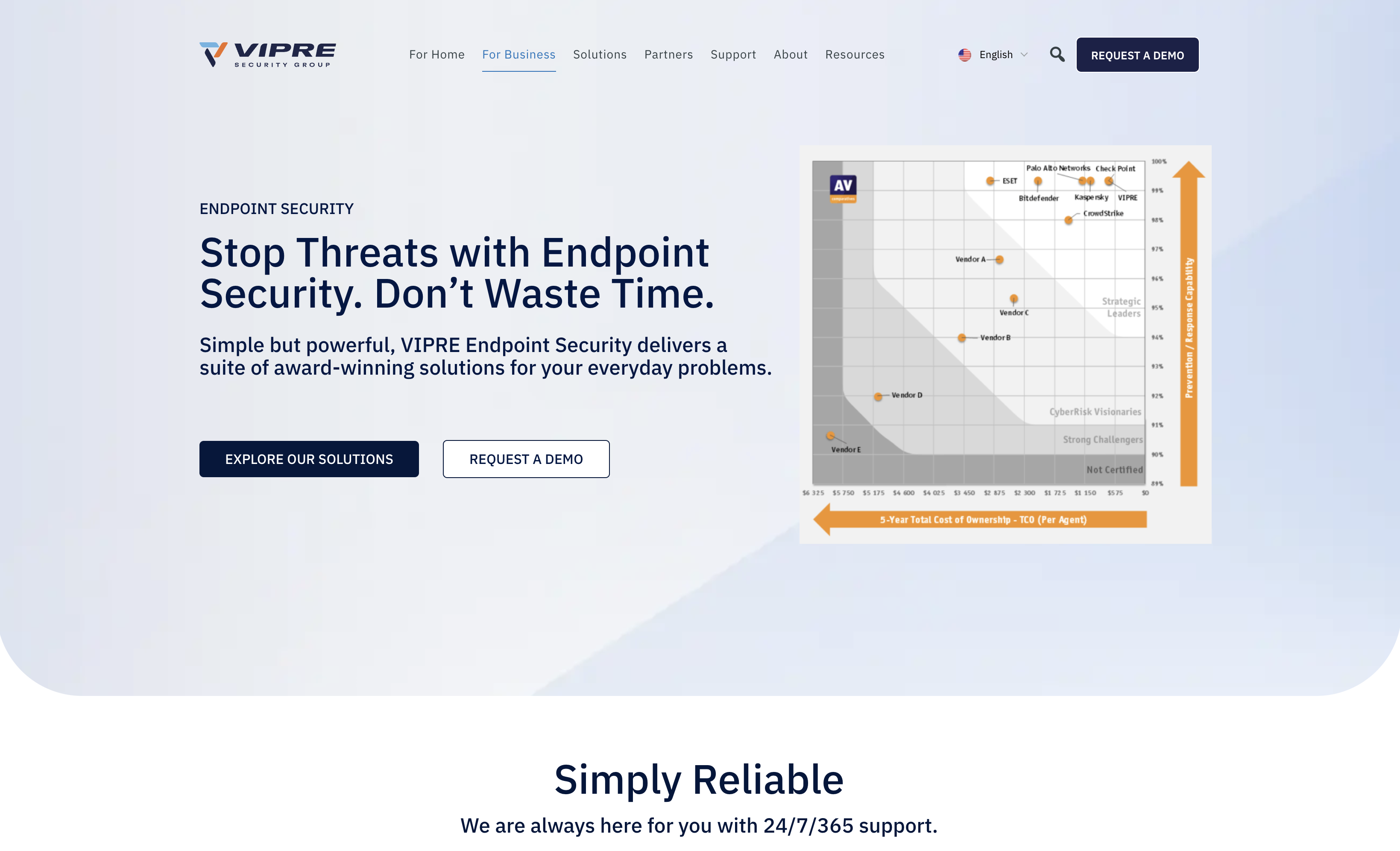
Vipre EDR is an endpoint detection and response solution designed to protect against advanced threats. It offers AI-powered threat detection, ransomware prevention, and easy deployment. Vipre EDR aims to provide robust security for businesses of all sizes, ensuring comprehensive protection with minimal system impact.
Vipre EDR Pricing
Vipre EDR's pricing is not public. Contact their support for more info.
Vipre EDR Reviews
Vipre EDR has an overall rating of 4.4 out of 5 stars based on 17 reviews. Users appreciate its ease of deployment and effectiveness in threat detection. Check out more of our reviews here!
Pros and Cons of Vipre EDR
Pros:
Easy to Install and Use: Advanced functionality with simple installation, making it accessible for users of all skill levels.
Ransomware Prevention and Rollback: Uses real-time behavior monitoring and AI to detect, prevent, and roll back ransomware effectively.
Complete View of Threat Behavior: Centralized view for quick investigation and remediation, enhancing overall security management.
Cons:
Initial Setup Complexity: Some users may find the initial setup and configuration process complex and time-consuming.
Limited User Feedback: The product has fewer reviews, which might indicate limited market penetration or user feedback.
Potential Compatibility Issues: Integration with existing systems may present challenges, requiring additional troubleshooting and support.
8. Forticlient
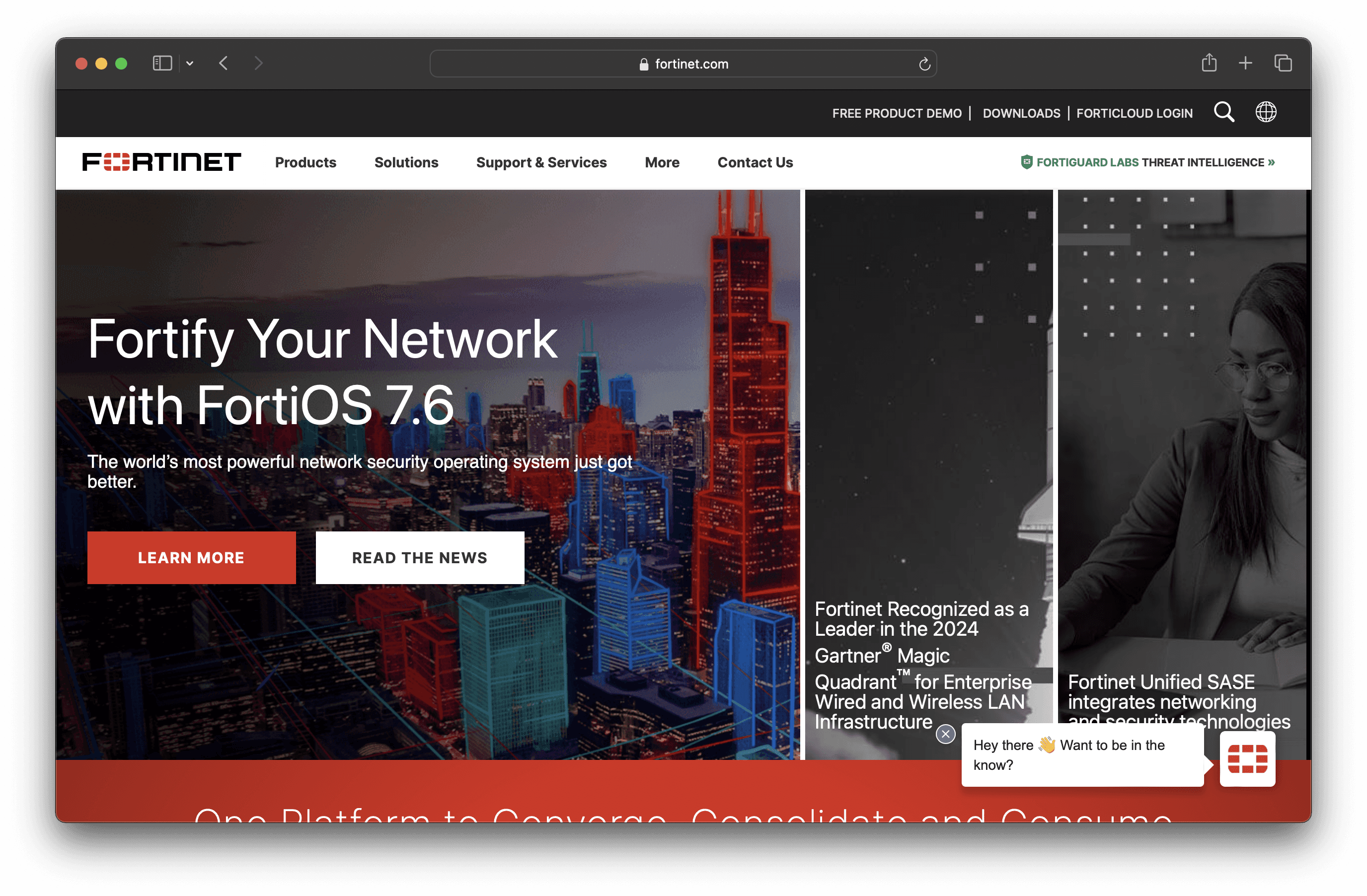
FortiClient is a security solution designed to provide endpoint protection, compliance, and secure access. It integrates with the Fortinet Security Fabric, offering features like Zero Trust Network Access (ZTNA), web filtering, and automated response. FortiClient aims to deliver robust security with easy deployment and centralized management.
Forticlient Pricing
VPN/ZTNA Edition: Contact their support for more info.
EPP/APT Edition: Contact their support for more info.
Chromebook Edition: Contact their support for more info.
Forticlient Reviews
FortiClient has an overall rating of 4.4 out of 5 stars based on 204 reviews. Users appreciate its reliability and ease of use. Check out more of our reviews here!
Pros and Cons of Forticlient
Pros:
Unified Security: Combines secure connectivity, endpoint protection, and advanced capabilities like EDR and XDR into a single agent.
Enhanced Visibility and Control: Provides IT teams with visibility and control over endpoints, and security teams benefit from automated threat detection and response.
AI-Based Security: Includes AI-based next-generation antivirus, endpoint quarantine, and application firewall.
Cons:
Complexity: The wide range of features and integrations might be complex for some organizations to fully utilize without proper training or professional services.
Dependency on Fortinet Ecosystem: Optimal performance and integration are achieved when used within the Fortinet Security Fabric, which may require additional investments in Fortinet products.
Initial Setup and Configuration: May require professional services for initial setup and configuration to ensure optimal performance and security.
9. NinjaOne
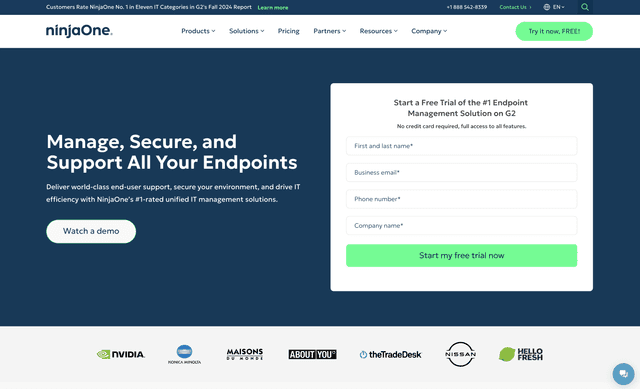
NinjaOne is an IT management solution designed to manage, secure, and support endpoints. It offers features like remote monitoring, patch management, and endpoint security. With easy deployment and centralized management, NinjaOne aims to provide a comprehensive and user-friendly solution for businesses of all sizes.
NinjaOne Pricing
NinjaOne's pricing is not public. Contact their support for more info.
NinjaOne Reviews
NinjaOne has an overall rating of 4.8 out of 5 stars based on 1,437 reviews. Users appreciate its ease of use and comprehensive features. Check out more of our reviews here!
Pros and Cons of NinjaOne
Pros:
Comprehensive Endpoint Management: Provides visibility and control over endpoints, supporting various operating systems and devices.
Ease of Use: Quick to implement, easy to learn, and intuitive to use, making it accessible for all skill levels.
Automation: Automates repetitive tasks, freeing up IT teams for strategic initiatives and reducing manual workload.
Cons:
Cost: While flexible payment options are mentioned, the actual cost is not detailed, which could be a concern for budget-conscious organizations.
Complexity for Small Teams: The extensive features and capabilities might be overwhelming for smaller IT teams or organizations with simpler needs.
Integration Challenges: Although integrations are highlighted, there could be potential challenges in integrating with existing systems or tools not listed on the page.
10. Acronis Cyber Protect Cloud
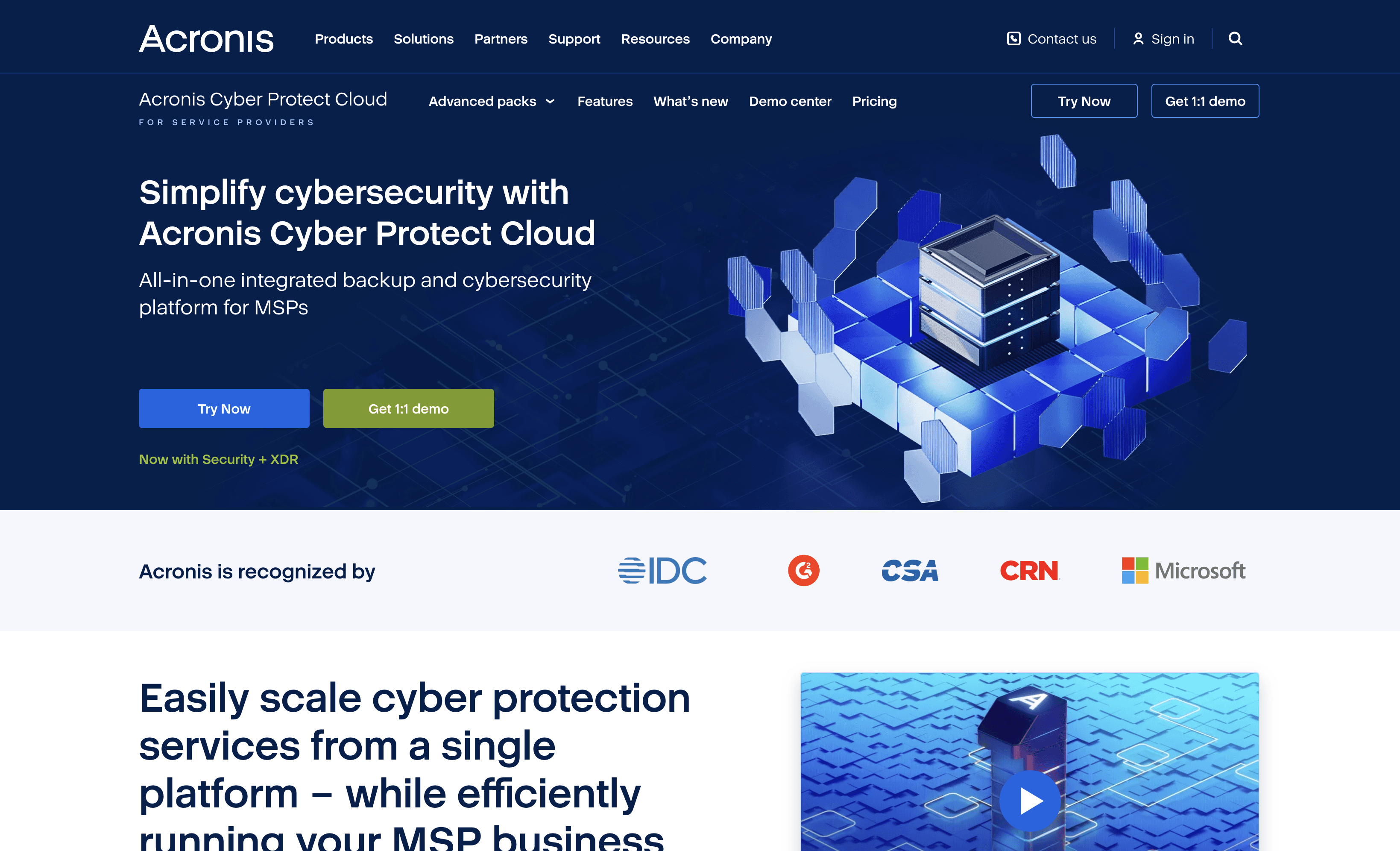
Acronis Cyber Protect Cloud is a comprehensive cyber protection solution designed for Managed Service Providers (MSPs). It integrates backup, disaster recovery, cybersecurity, and endpoint management into a single platform, aiming to simplify management and enhance security for businesses of all sizes.
Acronis Cyber Protect Cloud Pricing
Acronis Cyber Protect Cloud's pricing is not public. Contact their support for more info.
Acronis Cyber Protect Cloud Reviews
Acronis Cyber Protect Cloud has an overall rating of 4.7 out of 5 stars based on 975 reviews. Users appreciate its ease of use and comprehensive features. Check out more of our reviews here!
Pros and Cons of Acronis Cyber Protect Cloud
Pros:
Increased Control: Reduces complexity and allows control over services delivered to customers.
Vendor Consolidation: Consolidates multiple vendors, reducing costs, risks, and operational overhead.
Centralized Management & Monitoring: Single console for efficient management and monitoring of clients.
Cons:
Initial Setup Complexity: Integrating and setting up a comprehensive solution might require significant initial effort and expertise.
Cost: Comprehensive solutions with advanced features and support might come at a higher cost compared to simpler, standalone solutions.
Potential Compatibility Issues: Integration with existing systems may present challenges, requiring additional troubleshooting and support.
Looking to secure your technical infrastructure?
Twingate offers granular access controls and deployment automations to protect your VPC environment. By leveraging Zero Trust security tools, Twingate ensures that private resources and internet traffic remain secure in the modern world of work. Try Twingate for Free today!
Rapidly implement a modern Zero Trust network that is more secure and maintainable than VPNs.
The Best 10 Alternatives to Absolute Secure Endpoint (+ Pricing & Reviews)
Twingate Team
•
Jul 27, 2024

Absolute Secure Endpoint provides reliable and resilient endpoint security for the anywhere workforce. It serves as a source of truth for device and application health, protects at-risk devices and data, and delivers application self-healing and confident risk response. However, it might not be the choice for everyone. This article introduces Absolute's product offerings, focusing on Secure Endpoint and Secure Access solutions.

10 Alternatives to Absolute Secure Endpoint
1. WatchGuard Panda Adaptive Defense 360

WatchGuard Panda Adaptive Defense 360 is an advanced endpoint security solution that continuously monitors and classifies all activities on endpoints. It uses a Zero-Trust Application Service to ensure only trusted processes run and a Threat Hunting Service to proactively discover new hacking techniques, providing robust defense against cyber threats.
WatchGuard Panda Adaptive Defense 360 Pricing
WatchGuard Panda Adaptive Defense 360's pricing is not public. Contact their support for more info.
WatchGuard Panda Adaptive Defense 360 Reviews
WatchGuard Panda Adaptive Defense 360 has an overall rating of 4.4 out of 5 stars based on 115 reviews. Users appreciate its comprehensive protection and ease of use. Check out more of our reviews here!
Pros and Cons of WatchGuard Panda Adaptive Defense 360
Pros:
Automates and reduces detection, response, and investigation time, enhancing overall security efficiency.
Provides forensic information to investigate each attack attempt and tools to mitigate its effects.
Detects and blocks hacking techniques, tactics, and procedures, ensuring robust endpoint protection.
Cons:
Complexity in implementation may require significant setup and configuration efforts.
Dependency on cloud services for classification and threat hunting might be a concern for some organizations.
Advanced security features could come at a higher cost, potentially impacting smaller organizations.
2. SentinelOne

SentinelOne is an AI-powered cybersecurity platform designed to protect endpoints, cloud environments, and identity resources. It integrates various security tools to offer real-time data insights and automated threat responses, making it a comprehensive solution for enterprise-wide protection.
SentinelOne Pricing
Singularity Core: $69.99 per endpoint
Singularity Control: $79.99 per endpoint
Singularity Complete: $159.99 per endpoint
Singularity Commercial: $209.99 per endpoint
Singularity Enterprise: Contact their support for more info.
SentinelOne Reviews
SentinelOne has an overall rating of 4.7 out of 5 stars based on 179 reviews. Users appreciate its excellent threat visibility and fast response times. Check out more of our reviews here!
Pros and Cons ofSentinelOne
Pros:
AI-Powered Security: Utilizes AI to provide real-time protection and actionable insights, ensuring robust defense against evolving threats.
Comprehensive Protection: Covers endpoints, cloud, and identity resources, offering a unified security solution for diverse environments.
High Performance: Recognized for leading analytic coverage and zero detection delays, ensuring swift and accurate threat responses.
Cons:
Complexity: The platform's comprehensive nature may require significant time and resources to fully implement and manage.
Cost: Advanced features and AI capabilities might come at a higher price point, which could be a barrier for smaller organizations.
Learning Curve: Users may need extensive training to effectively utilize all features and capabilities of the platform.
3. WatchGuard Endpoint Security

WatchGuard Endpoint Security is a comprehensive cybersecurity solution designed to protect against advanced threats. It integrates next-gen antivirus, Endpoint Detection and Response (EDR), and DNS filtering into a unified platform. With centralized management and operational automation, it offers robust protection and ease of use for businesses of all sizes.
WatchGuard Endpoint Security Pricing
WatchGuard Endpoint Security's pricing is not public. Contact their support for more info.
WatchGuard Endpoint Security Reviews
WatchGuard Endpoint Security has an overall rating of 4.4 out of 5 stars based on 115 reviews. Users appreciate its comprehensive protection and ease of use. Check out more of our reviews here!
Pros and Cons of WatchGuard Endpoint Security
Pros:
Comprehensive Protection: Integrates next-gen antivirus, EDR, and DNS filtering for robust defense against advanced threats.
Unified Security Platform: Centralized management and operational automation streamline security processes and enhance visibility.
Advanced Threat Detection: Effectively identifies sophisticated threats like fileless malware, APTs, and ransomware.
Cons:
Complexity for Small Businesses: The platform's comprehensive nature may overwhelm smaller organizations with limited IT resources.
Dependency on Cloud: Heavy reliance on cloud-based management could be problematic for organizations with strict data residency requirements.
Potential Cost: Advanced features and integrated modules might come at a higher price, impacting budget-conscious organizations.
4. F-Secure Elements

F-Secure Elements is a cloud-native, AI-powered endpoint protection solution designed to safeguard various devices. It offers automated patch management, multi-engine malware protection, and cloud-based threat analysis. With easy deployment and centralized management, it aims to provide robust security for businesses of all sizes.
F-Secure Elements Pricing
F-Secure Elements's pricing is not public. Contact their support for more info.
F-Secure Elements Reviews
F-Secure Elements has an overall rating of 4.4 out of 5 stars based on 17 reviews. Users appreciate its ease of deployment and effectiveness in threat detection. Check out more of our reviews here!
Pros and Cons of F-Secure Elements
Pros:
Automated Patch Management: Blocks up to 80% of ransomware attacks, ensuring robust endpoint security.
Multi-engine Malware Protection: Provides comprehensive defense against various malware types, enhancing overall security.
Cloud-native Deployment: Simplifies management and monitoring from a single console, making it user-friendly.
Cons:
Premium Features: Advanced features like DataGuard and Endpoint Encryption are only available in the premium version.
Complex Interface: The interface may be overwhelming for smaller businesses with limited IT resources.
Dependence on Cloud: Requires a reliable internet connection for optimal performance and management.
5. Cylance

Cylance is an AI-driven cybersecurity solution designed to protect endpoints from advanced threats. It leverages machine learning to predict and prevent attacks in real-time, offering robust security with minimal system impact. Cylance aims to provide a seamless and effective defense for businesses of all sizes.
Cylance Pricing
Cylance's pricing is not public. Contact their support for more info.
Cylance Reviews
Cylance has an overall rating of 4.3 out of 5 stars based on 57 reviews. Users appreciate its AI-driven protection and ease of use. Check out more of our reviews here!
Pros and Cons of Cylance
Pros:
High Efficacy Ratings: Cylance AI-driven solutions deliver some of the highest efficacy ratings in the market, ensuring robust protection.
Low CPU Utilization: Uses up to 20x less CPU, even without an internet connection, compared to other solutions, enhancing performance.
Broad, Integrated Controls: Solutions span network, endpoint, and cloud, providing a resilient defense for any-sized organization.
Cons:
Initial Setup and Training: Onboarding and deployment require a training period to adapt the product to the environment, which can be time-consuming.
Dependence on AI: Heavy reliance on AI might be a concern for organizations that prefer more traditional, human-driven approaches to cybersecurity.
Cost: While cost-effective compared to building a SOC, the initial investment in AI-driven solutions might still be significant for smaller organizations.
6. Threatlocker

ThreatLocker is a cybersecurity solution focused on Zero Trust endpoint protection. It offers features like Allowlisting, Ringfencing™, and Network Control to prevent unauthorized access and malware. With easy deployment and centralized management, ThreatLocker aims to provide robust security for businesses of all sizes.
Threatlocker Pricing
Threatlocker's pricing is not public. Contact their support for more info.
Threatlocker Reviews
Threatlocker has an overall rating of 4.8 out of 5 stars based on 162 reviews. Users appreciate its robust security features and ease of use. Check out more of our reviews here!
Pros and Cons of Threatlocker
Pros:
Comprehensive Zero Trust Protection: ThreatLocker offers a robust Zero Trust endpoint protection platform, ensuring that only authorized applications and processes can run, significantly reducing the risk of cyber threats.
Wide Range of Features: With tools like Allowlisting, Ringfencing™, and Network Control, ThreatLocker provides extensive control over network traffic and application behavior, enhancing overall security.
24/7 Expert Support: The Cyber Hero® Team offers round-the-clock support, ensuring quick response times and expert assistance whenever needed, which is crucial for maintaining robust security.
Cons:
Steep Learning Curve: Implementing and managing ThreatLocker’s comprehensive features can be complex, requiring significant time and effort to fully understand and utilize the platform effectively.
Compatibility Issues: Some users have reported difficulties with integrating ThreatLocker into existing systems, which can lead to operational challenges and require additional troubleshooting.
Configuration Complexity: Setting up and configuring ThreatLocker to meet specific security needs can be intricate, potentially overwhelming smaller organizations with limited IT resources.
7. Vipre EDR

Vipre EDR is an endpoint detection and response solution designed to protect against advanced threats. It offers AI-powered threat detection, ransomware prevention, and easy deployment. Vipre EDR aims to provide robust security for businesses of all sizes, ensuring comprehensive protection with minimal system impact.
Vipre EDR Pricing
Vipre EDR's pricing is not public. Contact their support for more info.
Vipre EDR Reviews
Vipre EDR has an overall rating of 4.4 out of 5 stars based on 17 reviews. Users appreciate its ease of deployment and effectiveness in threat detection. Check out more of our reviews here!
Pros and Cons of Vipre EDR
Pros:
Easy to Install and Use: Advanced functionality with simple installation, making it accessible for users of all skill levels.
Ransomware Prevention and Rollback: Uses real-time behavior monitoring and AI to detect, prevent, and roll back ransomware effectively.
Complete View of Threat Behavior: Centralized view for quick investigation and remediation, enhancing overall security management.
Cons:
Initial Setup Complexity: Some users may find the initial setup and configuration process complex and time-consuming.
Limited User Feedback: The product has fewer reviews, which might indicate limited market penetration or user feedback.
Potential Compatibility Issues: Integration with existing systems may present challenges, requiring additional troubleshooting and support.
8. Forticlient

FortiClient is a security solution designed to provide endpoint protection, compliance, and secure access. It integrates with the Fortinet Security Fabric, offering features like Zero Trust Network Access (ZTNA), web filtering, and automated response. FortiClient aims to deliver robust security with easy deployment and centralized management.
Forticlient Pricing
VPN/ZTNA Edition: Contact their support for more info.
EPP/APT Edition: Contact their support for more info.
Chromebook Edition: Contact their support for more info.
Forticlient Reviews
FortiClient has an overall rating of 4.4 out of 5 stars based on 204 reviews. Users appreciate its reliability and ease of use. Check out more of our reviews here!
Pros and Cons of Forticlient
Pros:
Unified Security: Combines secure connectivity, endpoint protection, and advanced capabilities like EDR and XDR into a single agent.
Enhanced Visibility and Control: Provides IT teams with visibility and control over endpoints, and security teams benefit from automated threat detection and response.
AI-Based Security: Includes AI-based next-generation antivirus, endpoint quarantine, and application firewall.
Cons:
Complexity: The wide range of features and integrations might be complex for some organizations to fully utilize without proper training or professional services.
Dependency on Fortinet Ecosystem: Optimal performance and integration are achieved when used within the Fortinet Security Fabric, which may require additional investments in Fortinet products.
Initial Setup and Configuration: May require professional services for initial setup and configuration to ensure optimal performance and security.
9. NinjaOne

NinjaOne is an IT management solution designed to manage, secure, and support endpoints. It offers features like remote monitoring, patch management, and endpoint security. With easy deployment and centralized management, NinjaOne aims to provide a comprehensive and user-friendly solution for businesses of all sizes.
NinjaOne Pricing
NinjaOne's pricing is not public. Contact their support for more info.
NinjaOne Reviews
NinjaOne has an overall rating of 4.8 out of 5 stars based on 1,437 reviews. Users appreciate its ease of use and comprehensive features. Check out more of our reviews here!
Pros and Cons of NinjaOne
Pros:
Comprehensive Endpoint Management: Provides visibility and control over endpoints, supporting various operating systems and devices.
Ease of Use: Quick to implement, easy to learn, and intuitive to use, making it accessible for all skill levels.
Automation: Automates repetitive tasks, freeing up IT teams for strategic initiatives and reducing manual workload.
Cons:
Cost: While flexible payment options are mentioned, the actual cost is not detailed, which could be a concern for budget-conscious organizations.
Complexity for Small Teams: The extensive features and capabilities might be overwhelming for smaller IT teams or organizations with simpler needs.
Integration Challenges: Although integrations are highlighted, there could be potential challenges in integrating with existing systems or tools not listed on the page.
10. Acronis Cyber Protect Cloud

Acronis Cyber Protect Cloud is a comprehensive cyber protection solution designed for Managed Service Providers (MSPs). It integrates backup, disaster recovery, cybersecurity, and endpoint management into a single platform, aiming to simplify management and enhance security for businesses of all sizes.
Acronis Cyber Protect Cloud Pricing
Acronis Cyber Protect Cloud's pricing is not public. Contact their support for more info.
Acronis Cyber Protect Cloud Reviews
Acronis Cyber Protect Cloud has an overall rating of 4.7 out of 5 stars based on 975 reviews. Users appreciate its ease of use and comprehensive features. Check out more of our reviews here!
Pros and Cons of Acronis Cyber Protect Cloud
Pros:
Increased Control: Reduces complexity and allows control over services delivered to customers.
Vendor Consolidation: Consolidates multiple vendors, reducing costs, risks, and operational overhead.
Centralized Management & Monitoring: Single console for efficient management and monitoring of clients.
Cons:
Initial Setup Complexity: Integrating and setting up a comprehensive solution might require significant initial effort and expertise.
Cost: Comprehensive solutions with advanced features and support might come at a higher cost compared to simpler, standalone solutions.
Potential Compatibility Issues: Integration with existing systems may present challenges, requiring additional troubleshooting and support.
Looking to secure your technical infrastructure?
Twingate offers granular access controls and deployment automations to protect your VPC environment. By leveraging Zero Trust security tools, Twingate ensures that private resources and internet traffic remain secure in the modern world of work. Try Twingate for Free today!
Rapidly implement a modern Zero Trust network that is more secure and maintainable than VPNs.
The Best 10 Alternatives to Absolute Secure Endpoint (+ Pricing & Reviews)
Twingate Team
•
Jul 27, 2024

Absolute Secure Endpoint provides reliable and resilient endpoint security for the anywhere workforce. It serves as a source of truth for device and application health, protects at-risk devices and data, and delivers application self-healing and confident risk response. However, it might not be the choice for everyone. This article introduces Absolute's product offerings, focusing on Secure Endpoint and Secure Access solutions.

10 Alternatives to Absolute Secure Endpoint
1. WatchGuard Panda Adaptive Defense 360

WatchGuard Panda Adaptive Defense 360 is an advanced endpoint security solution that continuously monitors and classifies all activities on endpoints. It uses a Zero-Trust Application Service to ensure only trusted processes run and a Threat Hunting Service to proactively discover new hacking techniques, providing robust defense against cyber threats.
WatchGuard Panda Adaptive Defense 360 Pricing
WatchGuard Panda Adaptive Defense 360's pricing is not public. Contact their support for more info.
WatchGuard Panda Adaptive Defense 360 Reviews
WatchGuard Panda Adaptive Defense 360 has an overall rating of 4.4 out of 5 stars based on 115 reviews. Users appreciate its comprehensive protection and ease of use. Check out more of our reviews here!
Pros and Cons of WatchGuard Panda Adaptive Defense 360
Pros:
Automates and reduces detection, response, and investigation time, enhancing overall security efficiency.
Provides forensic information to investigate each attack attempt and tools to mitigate its effects.
Detects and blocks hacking techniques, tactics, and procedures, ensuring robust endpoint protection.
Cons:
Complexity in implementation may require significant setup and configuration efforts.
Dependency on cloud services for classification and threat hunting might be a concern for some organizations.
Advanced security features could come at a higher cost, potentially impacting smaller organizations.
2. SentinelOne

SentinelOne is an AI-powered cybersecurity platform designed to protect endpoints, cloud environments, and identity resources. It integrates various security tools to offer real-time data insights and automated threat responses, making it a comprehensive solution for enterprise-wide protection.
SentinelOne Pricing
Singularity Core: $69.99 per endpoint
Singularity Control: $79.99 per endpoint
Singularity Complete: $159.99 per endpoint
Singularity Commercial: $209.99 per endpoint
Singularity Enterprise: Contact their support for more info.
SentinelOne Reviews
SentinelOne has an overall rating of 4.7 out of 5 stars based on 179 reviews. Users appreciate its excellent threat visibility and fast response times. Check out more of our reviews here!
Pros and Cons ofSentinelOne
Pros:
AI-Powered Security: Utilizes AI to provide real-time protection and actionable insights, ensuring robust defense against evolving threats.
Comprehensive Protection: Covers endpoints, cloud, and identity resources, offering a unified security solution for diverse environments.
High Performance: Recognized for leading analytic coverage and zero detection delays, ensuring swift and accurate threat responses.
Cons:
Complexity: The platform's comprehensive nature may require significant time and resources to fully implement and manage.
Cost: Advanced features and AI capabilities might come at a higher price point, which could be a barrier for smaller organizations.
Learning Curve: Users may need extensive training to effectively utilize all features and capabilities of the platform.
3. WatchGuard Endpoint Security

WatchGuard Endpoint Security is a comprehensive cybersecurity solution designed to protect against advanced threats. It integrates next-gen antivirus, Endpoint Detection and Response (EDR), and DNS filtering into a unified platform. With centralized management and operational automation, it offers robust protection and ease of use for businesses of all sizes.
WatchGuard Endpoint Security Pricing
WatchGuard Endpoint Security's pricing is not public. Contact their support for more info.
WatchGuard Endpoint Security Reviews
WatchGuard Endpoint Security has an overall rating of 4.4 out of 5 stars based on 115 reviews. Users appreciate its comprehensive protection and ease of use. Check out more of our reviews here!
Pros and Cons of WatchGuard Endpoint Security
Pros:
Comprehensive Protection: Integrates next-gen antivirus, EDR, and DNS filtering for robust defense against advanced threats.
Unified Security Platform: Centralized management and operational automation streamline security processes and enhance visibility.
Advanced Threat Detection: Effectively identifies sophisticated threats like fileless malware, APTs, and ransomware.
Cons:
Complexity for Small Businesses: The platform's comprehensive nature may overwhelm smaller organizations with limited IT resources.
Dependency on Cloud: Heavy reliance on cloud-based management could be problematic for organizations with strict data residency requirements.
Potential Cost: Advanced features and integrated modules might come at a higher price, impacting budget-conscious organizations.
4. F-Secure Elements

F-Secure Elements is a cloud-native, AI-powered endpoint protection solution designed to safeguard various devices. It offers automated patch management, multi-engine malware protection, and cloud-based threat analysis. With easy deployment and centralized management, it aims to provide robust security for businesses of all sizes.
F-Secure Elements Pricing
F-Secure Elements's pricing is not public. Contact their support for more info.
F-Secure Elements Reviews
F-Secure Elements has an overall rating of 4.4 out of 5 stars based on 17 reviews. Users appreciate its ease of deployment and effectiveness in threat detection. Check out more of our reviews here!
Pros and Cons of F-Secure Elements
Pros:
Automated Patch Management: Blocks up to 80% of ransomware attacks, ensuring robust endpoint security.
Multi-engine Malware Protection: Provides comprehensive defense against various malware types, enhancing overall security.
Cloud-native Deployment: Simplifies management and monitoring from a single console, making it user-friendly.
Cons:
Premium Features: Advanced features like DataGuard and Endpoint Encryption are only available in the premium version.
Complex Interface: The interface may be overwhelming for smaller businesses with limited IT resources.
Dependence on Cloud: Requires a reliable internet connection for optimal performance and management.
5. Cylance

Cylance is an AI-driven cybersecurity solution designed to protect endpoints from advanced threats. It leverages machine learning to predict and prevent attacks in real-time, offering robust security with minimal system impact. Cylance aims to provide a seamless and effective defense for businesses of all sizes.
Cylance Pricing
Cylance's pricing is not public. Contact their support for more info.
Cylance Reviews
Cylance has an overall rating of 4.3 out of 5 stars based on 57 reviews. Users appreciate its AI-driven protection and ease of use. Check out more of our reviews here!
Pros and Cons of Cylance
Pros:
High Efficacy Ratings: Cylance AI-driven solutions deliver some of the highest efficacy ratings in the market, ensuring robust protection.
Low CPU Utilization: Uses up to 20x less CPU, even without an internet connection, compared to other solutions, enhancing performance.
Broad, Integrated Controls: Solutions span network, endpoint, and cloud, providing a resilient defense for any-sized organization.
Cons:
Initial Setup and Training: Onboarding and deployment require a training period to adapt the product to the environment, which can be time-consuming.
Dependence on AI: Heavy reliance on AI might be a concern for organizations that prefer more traditional, human-driven approaches to cybersecurity.
Cost: While cost-effective compared to building a SOC, the initial investment in AI-driven solutions might still be significant for smaller organizations.
6. Threatlocker

ThreatLocker is a cybersecurity solution focused on Zero Trust endpoint protection. It offers features like Allowlisting, Ringfencing™, and Network Control to prevent unauthorized access and malware. With easy deployment and centralized management, ThreatLocker aims to provide robust security for businesses of all sizes.
Threatlocker Pricing
Threatlocker's pricing is not public. Contact their support for more info.
Threatlocker Reviews
Threatlocker has an overall rating of 4.8 out of 5 stars based on 162 reviews. Users appreciate its robust security features and ease of use. Check out more of our reviews here!
Pros and Cons of Threatlocker
Pros:
Comprehensive Zero Trust Protection: ThreatLocker offers a robust Zero Trust endpoint protection platform, ensuring that only authorized applications and processes can run, significantly reducing the risk of cyber threats.
Wide Range of Features: With tools like Allowlisting, Ringfencing™, and Network Control, ThreatLocker provides extensive control over network traffic and application behavior, enhancing overall security.
24/7 Expert Support: The Cyber Hero® Team offers round-the-clock support, ensuring quick response times and expert assistance whenever needed, which is crucial for maintaining robust security.
Cons:
Steep Learning Curve: Implementing and managing ThreatLocker’s comprehensive features can be complex, requiring significant time and effort to fully understand and utilize the platform effectively.
Compatibility Issues: Some users have reported difficulties with integrating ThreatLocker into existing systems, which can lead to operational challenges and require additional troubleshooting.
Configuration Complexity: Setting up and configuring ThreatLocker to meet specific security needs can be intricate, potentially overwhelming smaller organizations with limited IT resources.
7. Vipre EDR

Vipre EDR is an endpoint detection and response solution designed to protect against advanced threats. It offers AI-powered threat detection, ransomware prevention, and easy deployment. Vipre EDR aims to provide robust security for businesses of all sizes, ensuring comprehensive protection with minimal system impact.
Vipre EDR Pricing
Vipre EDR's pricing is not public. Contact their support for more info.
Vipre EDR Reviews
Vipre EDR has an overall rating of 4.4 out of 5 stars based on 17 reviews. Users appreciate its ease of deployment and effectiveness in threat detection. Check out more of our reviews here!
Pros and Cons of Vipre EDR
Pros:
Easy to Install and Use: Advanced functionality with simple installation, making it accessible for users of all skill levels.
Ransomware Prevention and Rollback: Uses real-time behavior monitoring and AI to detect, prevent, and roll back ransomware effectively.
Complete View of Threat Behavior: Centralized view for quick investigation and remediation, enhancing overall security management.
Cons:
Initial Setup Complexity: Some users may find the initial setup and configuration process complex and time-consuming.
Limited User Feedback: The product has fewer reviews, which might indicate limited market penetration or user feedback.
Potential Compatibility Issues: Integration with existing systems may present challenges, requiring additional troubleshooting and support.
8. Forticlient

FortiClient is a security solution designed to provide endpoint protection, compliance, and secure access. It integrates with the Fortinet Security Fabric, offering features like Zero Trust Network Access (ZTNA), web filtering, and automated response. FortiClient aims to deliver robust security with easy deployment and centralized management.
Forticlient Pricing
VPN/ZTNA Edition: Contact their support for more info.
EPP/APT Edition: Contact their support for more info.
Chromebook Edition: Contact their support for more info.
Forticlient Reviews
FortiClient has an overall rating of 4.4 out of 5 stars based on 204 reviews. Users appreciate its reliability and ease of use. Check out more of our reviews here!
Pros and Cons of Forticlient
Pros:
Unified Security: Combines secure connectivity, endpoint protection, and advanced capabilities like EDR and XDR into a single agent.
Enhanced Visibility and Control: Provides IT teams with visibility and control over endpoints, and security teams benefit from automated threat detection and response.
AI-Based Security: Includes AI-based next-generation antivirus, endpoint quarantine, and application firewall.
Cons:
Complexity: The wide range of features and integrations might be complex for some organizations to fully utilize without proper training or professional services.
Dependency on Fortinet Ecosystem: Optimal performance and integration are achieved when used within the Fortinet Security Fabric, which may require additional investments in Fortinet products.
Initial Setup and Configuration: May require professional services for initial setup and configuration to ensure optimal performance and security.
9. NinjaOne

NinjaOne is an IT management solution designed to manage, secure, and support endpoints. It offers features like remote monitoring, patch management, and endpoint security. With easy deployment and centralized management, NinjaOne aims to provide a comprehensive and user-friendly solution for businesses of all sizes.
NinjaOne Pricing
NinjaOne's pricing is not public. Contact their support for more info.
NinjaOne Reviews
NinjaOne has an overall rating of 4.8 out of 5 stars based on 1,437 reviews. Users appreciate its ease of use and comprehensive features. Check out more of our reviews here!
Pros and Cons of NinjaOne
Pros:
Comprehensive Endpoint Management: Provides visibility and control over endpoints, supporting various operating systems and devices.
Ease of Use: Quick to implement, easy to learn, and intuitive to use, making it accessible for all skill levels.
Automation: Automates repetitive tasks, freeing up IT teams for strategic initiatives and reducing manual workload.
Cons:
Cost: While flexible payment options are mentioned, the actual cost is not detailed, which could be a concern for budget-conscious organizations.
Complexity for Small Teams: The extensive features and capabilities might be overwhelming for smaller IT teams or organizations with simpler needs.
Integration Challenges: Although integrations are highlighted, there could be potential challenges in integrating with existing systems or tools not listed on the page.
10. Acronis Cyber Protect Cloud

Acronis Cyber Protect Cloud is a comprehensive cyber protection solution designed for Managed Service Providers (MSPs). It integrates backup, disaster recovery, cybersecurity, and endpoint management into a single platform, aiming to simplify management and enhance security for businesses of all sizes.
Acronis Cyber Protect Cloud Pricing
Acronis Cyber Protect Cloud's pricing is not public. Contact their support for more info.
Acronis Cyber Protect Cloud Reviews
Acronis Cyber Protect Cloud has an overall rating of 4.7 out of 5 stars based on 975 reviews. Users appreciate its ease of use and comprehensive features. Check out more of our reviews here!
Pros and Cons of Acronis Cyber Protect Cloud
Pros:
Increased Control: Reduces complexity and allows control over services delivered to customers.
Vendor Consolidation: Consolidates multiple vendors, reducing costs, risks, and operational overhead.
Centralized Management & Monitoring: Single console for efficient management and monitoring of clients.
Cons:
Initial Setup Complexity: Integrating and setting up a comprehensive solution might require significant initial effort and expertise.
Cost: Comprehensive solutions with advanced features and support might come at a higher cost compared to simpler, standalone solutions.
Potential Compatibility Issues: Integration with existing systems may present challenges, requiring additional troubleshooting and support.
Looking to secure your technical infrastructure?
Twingate offers granular access controls and deployment automations to protect your VPC environment. By leveraging Zero Trust security tools, Twingate ensures that private resources and internet traffic remain secure in the modern world of work. Try Twingate for Free today!
Solutions
Solutions
The VPN replacement your workforce will love.
Solutions